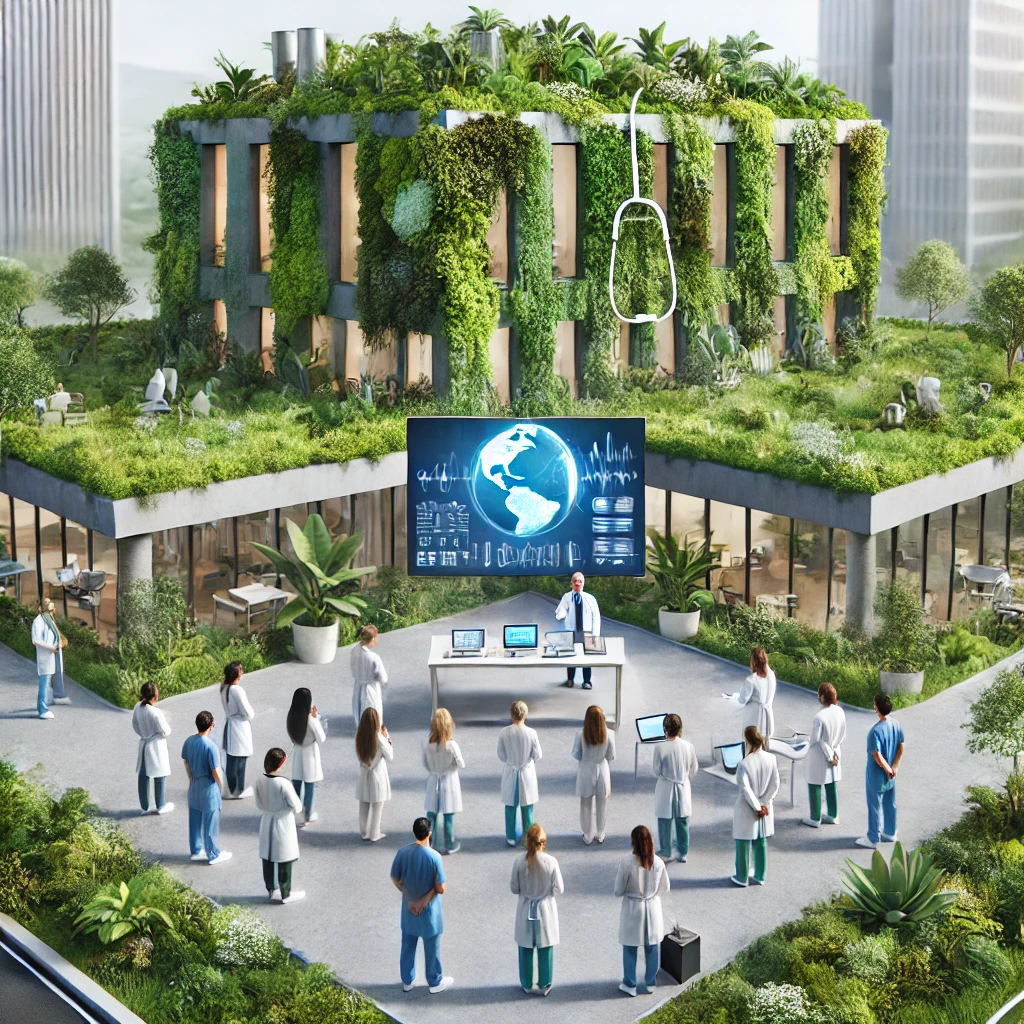0 (0 Ratings)
Health Education and coaching in “Green Hospital” – Empowering Healthcare Workers to Enhance Community Well-being Part 1

About Course
Course Overview The concept of a “Green Hospital” is fundamentally about enhancing the efficiency and sustainability of healthcare facilities while minimizing their environmental impact. Training needs
- Lack of awareness of eco-friendly building materials and energy-efficient designs.
- Lack of training on lifecycle cost analysis for sustainable infrastructure.
- Lack of knowledge about hazardous chemicals in workplace environments.
- Lack of compliance with international chemical safety standards.
- Insufficient understanding of eco-friendly and non-toxic alternatives.
- Inadequate strategies for integrating solar, wind, and geothermal energy.
- Limited public awareness of sustainability practices.
- Lack of incentives to encourage community participation in sustainability efforts.
- Understanding Sustainability in Healthcare: Many healthcare professionals lack formal training in sustainable facility design and operation.
- Practical Implementation Strategies: Healthcare administrators need guidance on cost-effective sustainability strategies.
- Regulatory and Compliance Knowledge: Participants need to be aware of national and international regulations related to green healthcare practices.
- Interdisciplinary Collaboration: Sustainability efforts require coordination between multiple departments, necessitating teamwork and leadership training.
- Innovation and Technology in Green Healthcare: Emerging technologies in sustainable healthcare need to be understood and integrated effectively.
- Limited cultural adaptation of sustainability messages.
- Lack of connection between employee health and sustainable workplace environments.
- Limited knowledge of sustainable agricultural practices.
- Lack of policies promoting responsible printing, lighting, and water usage.
- Failure to educate consumers and employees about reducing waste impact.
Outcomes “By the end of this course, participants will be able to:
- Develop and Implement Sustainable Hospital Designs – Understand best practices for eco-friendly hospital architecture, energy-efficient systems, and green certifications.
- Optimize Energy and Resource Use – Apply strategies for saving energy, using renewable resources, and reducing operational costs.
- Promote Chemical Safety and Sustainable Alternatives – Identify hazardous chemicals in healthcare settings and implement safer, sustainable alternatives.
- Enhance Community Engagement in Green Initiatives – Develop educational and participatory programs for hospital staff and the surrounding community.
- Implement Employee Wellness Programs with a Green Focus – Create workplace wellness initiatives that align with sustainability goals.
- Design and Support a Sustainable Food System – Incorporate local, organic, and eco-friendly food options into hospital meal programs.
- Manage Waste Reduction and Water Conservation – Develop strategies for minimizing hospital waste and conserving water.
- Improve Transportation and Mobility for Sustainability – Implement eco-friendly transportation solutions for hospital staff, patients, and visitors. Integrate Stress Management into Green Practices – Promote stress reduction techniques that align with sustainable healthcare practices.”
Course Curriculum
Sustainable facility design and operation
-
Sustainable facility design and operation part2
22:39 -
Quiz 1
Chemical safety and it’s alternative
-
Chemical safety and it’s alternative 1
27:37 -
Chemical safety and it’s alternative 2
27:54 -
Quiz 2
Saving energy and renewable resources
-
Saving energy and renewable resources part1
30:27 -
Saving energy and renewable resources part2
31:52 -
Quiz 3
Community parcipitation and education
-
Community parcipitation and education part 1
25:30 -
Community parcipitation and education part 2
30:29 -
Community parcipitation and education part 3
30:02
Employee wellness program with a green focus
-
Employee wellness program with a green focus part1
29:45 -
Employee wellness program with a green focus part 2
29:58
Post – test
-
Post Test
Evaluation Form
-
Activity Evaluation
-
How to Download Course Completion Certificate
01:24
Student Ratings & Reviews

No Review Yet
This course is full right now. We limit the number of students to create an optimized and productive group dynamic.
-
LevelAll Levels
-
Total Enrolled2
-
Last UpdatedMay 31, 2025
-
CertificateCertificate of completion
Hi, Welcome back!
